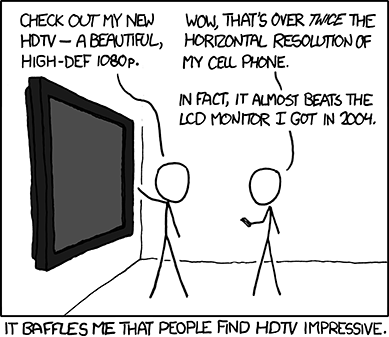732: HDTV
| HDTV |
 Title text: We're also stuck with blurry, juddery, slow-panning 24fps movies forever because (thanks to 60fps home video) people associate high framerates with camcorders and cheap sitcoms, and thus think good framerates look fake. |
Explanation
This comic pokes fun at the differing standard between image quality for television sets and electronic devices, even though both are based on essentially the same standards. When rating television sets, a 1080p screen, that is, a screen 1,920 pixels wide and 1,080 pixels tall with progressive scan, is considered impressive. In contrast, the same resolution with a computer device is considered standard fare, given that on a 4:3 ratio computer screen 1,024 pixels wide is expected. Widescreen monitors have already surpassed 1,920 pixels wide, and double widescreen monitors have become more common.
The title texts explains another disagreement involving images and popular opinion. The feeling that a viewer gets from watching a film in a theatre is different from the feeling from a home film, or again, between a serialized programme from an international television channel and a locally-broadcast programme. The disparity is that the small-time productions actually implement better-quality equipment than the big-time productions, in terms of higher frame rate (although not in image fidelity or other respects). However the small productions really are cheaper in other respects, and this feeling is transferred to the look of high frame rates, thanks to videotapes often being used instead of film stock. Low frame rates on more big budget films (and all old, nostalgic productions before high frame rates were commercially possible) mean low frame rates are associated with quality, despite not being as able to capture as much motion as better-quality high frame rates. Blur, judder, and slow pans are mostly absent in high-frame rate productions. This is changing, however, since the major films The Hobbit and Avatar 2 are/will be shot with better framerates.
Transcript
- [Cueball is pointing to a huge flatscreen HDTV on the wall. His friend is holding a cell phone.]
- Cueball (HDTV Owner): Check out my new HDTV-a beautiful, high-def 1080p.
- Friend: Wow, that's over TWICE the horizontal resolution of my cell phone.
- Friend: In fact, it almost beats the LCD monitor I got in 2004.
- It baffles me that people find HDTV impressive.
Discussion
But it's on a bigger screen. Jokes aside, I believe TVs are more impressive because the refresh rate is higher and the TV needs more circuitry on the back-end to handle the physically larger screen and the multiple possible inputs. I may be wrong. Davidy22[talk] 13:25, 18 February 2013 (UTC)
The commentary about computer screen sizes needs to be dated and/or updated, as it's clearly outdated. 108.162.212.196 17:17, 11 January 2014 (UTC)
- I don't think that's the case. TV's rely on standards, think of blu-ray, dvd, VHS, DVB-C (cable). A change in media format would require users to buy a new hardware, people are likely not willing to buy new equipment every two years.
- For computers it's different. The video output is generated and not played back. Computers are more flexible and if a format is not supported a simple update can fix everything. Necessaryevil (talk) 15:25, 13 December 2018 (UTC)
 Add comment
Add comment
